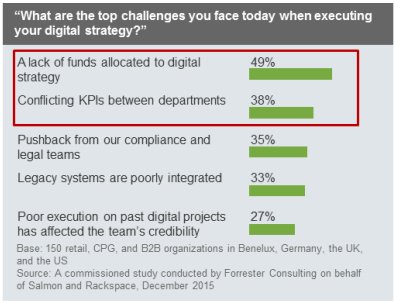Over a third (36%) cannot measure the business results of digital investment, with a lack of funding and conflicting KPIs cited as key reasons for the shortfall, according to a new study.

The survey from Salmon and Rackspace, entitled ‘Prepare Your Business for the Digital Future’, indicates there is a lack of digital strategy amongst organisations which could hinder digital transformation.
Key findings:
• While 81% of businesses have a clearly defined & articulated digital strategy, only 11% are digital experts – the majority (57%) are classified as laggards hindered by weak strategies and lacking the ability to execute
• Over a third (36%) cannot measure the business results of digital investment
• The top challenges faced in digitalising successfully are: a lack of funds allocated (49%), conflicting KPIs (38%), poor legacy integration (33%) and poor execution on past projects impacting digital credibility (27%)

The study was announced at Salmon’s Commerce 2020 event which explored the future of digital commerce and launched Salmon’s “Programmatic Commerce” concept.
It revealed that digital is a priority for businesses – 81% of organisations have a digital strategy in place and almost three-quarters (74%) believe they have defined processes, the right structure and skills to deliver digital projects. However more than a third (36%) admit they cannot measure the business impact and benefits of digital investment.
To evaluate an organisation’s maturity, Forrester asked respondents to assess their digital strategy, organisation, and technology, examining dimensions such as executive support, vision, resourcing, and operational effectiveness.
Based on the results, respondents were segmented into four categories: experts, operators, strategists and laggards. The study found that one in 10 (11%) are digital experts, with the majority (57%) of businesses surveyed being laggards – laggard is defined as a company with weak digital transformation strategies and lacking the ability to execute.
“Digital transformation can open up new revenue streams, improve operational efficiency and help organisations deliver new services,” commented Neil Stewart, CEO, Salmon. “‘Digital’ is not a new phenomenon, however, embarking on projects still brings challenges – from unified decision-making to ensuring the right in-house skills are in place. This study shows that the problem is two-fold – most businesses not only invest without the right strategy but their ability to execute is poor. This is a huge problem and it must be addressed. Businesses need help to digitally transform and all in the industry, from vendors to governments, must act now.”
Key challenges
Looking at the top challenges organisations faced, those identified were: a lack of funds allocated to digital strategy (49%), conflicting KPIs from across the business (38%), poor integration with legacy systems (33%) and poor execution on past projects impacting the digital team’s credibility (27%).
“For those businesses starting their digital journey, it is essential to appreciate what their customers need. An external view is vital when understanding how to build a successful digital strategy. This is particularly noticeable in the retail industry, where consumers expect engagement across different channels. It is reassuring that so many businesses are making digital transformation a high priority and are already gearing up to deliver on their strategies,” said Mike Bainbridge, Chief Digital Technologist, Rackspace. “The initial costs of implementing a digital strategy may seem high, but having the right tools and experts in place to deliver great digital experiences to customers, can lead to a significant impact on business revenue.”
Three tips for digital transformation
In response to the study of global IT and business decision-makers, Salmon and Rackspace have developed three pillars on which they believe all businesses should approach digital transformation – taking them from laggard to expert:
1. Focus digital transformation on the customer: the study revealed that the experts approached digital with customer impact in mind, focused on generating new revenue, attracting new customers and launching into new markets. Whereas laggards focus on internal processes and cost reduction. All businesses should take the outward-looking approach – first decide what their digital customer experience will be and build their strategy from there.
2. Unite the business to drive digital: digital transformation cannot sit with one team. Instead, organisations should assess digital requirements from across the business and set objectives. They should bring together cross-functional digital talent and break away from legacy ways of operating. A digital Centre of Excellence combining business, customer experience, and technology expertise is a great start.
3. Find the right funding model: the study revealed that digital experts set clearly defined and articulated KPIs not only targeted at revenue. Across the business, metrics such as customer lifetime value and employee satisfaction are just as important as increase in revenue. Digital experts also developed their digital strategies with the involvement of finance department to establish a clear funding model early on.
Methodology
The study was carried out by Forrester Consulting, an independent technology and market research company. It surveyed 150 IT and business decision-makers from the retail, consumer packaged goods (CPG), and business-to-business (B2B) industries. The study was carried out across the UK, US, Germany and Benelux.
To download the full study, click here (registration required)
